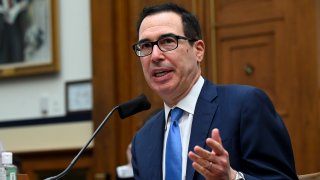
Dozens of email accounts at the Treasury Department were compromised in a massive breach of U.S. government agencies being blamed on Russia, with hackers breaking into systems used by the department's highest-ranking officials, a senator said Monday after being briefed on the matter.
Sen. Ron Wyden, D-Ore., provided new details of the hack following a briefing to Senate Finance Committee staff by the IRS and Treasury Department.
Wyden said that though there is no indication that taxpayer data was compromised, the hack “appears to be significant,” including through the compromise of dozens of email accounts and access to the Departmental Offices division of the Treasury Department, which the senator said was home to its highest-ranking officials. In addition, the breach appears to involve the theft of encryption keys from U.S. government servers, Wyden said.
“Treasury still does not know all of the actions taken by hackers, or precisely what information was stolen,” Wyden said in a statement.
It is also not clear what Russian hackers intend to do with any emails they may have accessed.
Speaking to CNBC on Monday, Treasury Secretary Steven Mnuchin said, "our unclassified systems did have some access" from hackers.
"At this point, we do not see any break in into our classified systems," he said, before later adding: "There's been no damage, nor have we seen any large amounts of information displaced."
U.S. & World
Treasury was among the earliest known agencies reported to have been affected in a breach that now encompasses a broad spectrum of departments. The effects and consequences of the hack are still being assessed, though the Department of Homeland Security's cybersecurity arm said in a statement last week that the intrusion posed a “grave” risk to government and private networks.
In the Treasury Department's case, Wyden said, the breach began in July. But experts believe the overall hacking operation began months earlier when malicious code was slipped into updates to popular software that monitors computer networks of businesses and governments.
The malware, affecting a product made by U.S. company SolarWinds, gave elite hackers remote access into an organization’s networks so they could steal information.
It wasn’t discovered until the prominent cybersecurity company FireEye determined it had been hacked.
Tech giant Microsoft, which has helped respond to the breach, revealed last week that it had identified more than 40 government agencies, think tanks, nongovernmental organizations and IT companies infiltrated by the hackers. Microsoft notified the Treasury Department that dozens of email accounts were compromised, Wyden said.
President Donald Trump sought to downplay the severity of the hack last week, tweeting without any evidence that perhaps China was responsible. At least two Cabinet members, Secretary of State Mike Pompeo and Attorney General William Barr, have stated publicly that they believe Russia was to blame, the consensus of others in the U.S. government and of the cybersecurity community.
The Treasury Department is at least the third federal agency, along with the Commerce and Energy departments, to acknowledge that it was hacked as part of a far-reaching espionage campaign widely believed to be the work of Russian intelligence.



